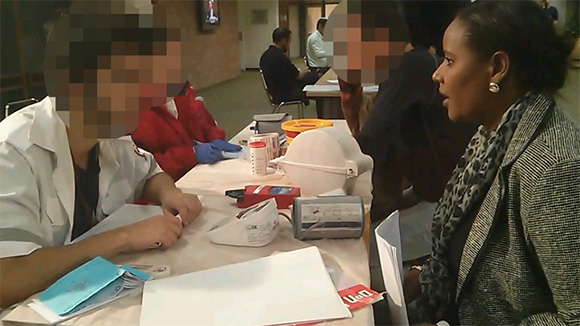The refusal by Israel’s official blood bank service, Magen David Adom (MDA), to accept blood from an “Ethiopian Jew” who is also a Knesset member, has once again underlined the true racist nature of the Zionist state.

According to a report in the Israeli Ynet News, the MDA set up a blood donation clinic in the Knesset building. Knesset member Pnina Tamano-Shata, tried to donate blood but was told she could not because she had “the special kind of Jewish-Ethiopian blood.”
The refusal to accept her blood is based on a Health Ministry regulation which actively discriminates against Africans.
It is claimed that the discrimination is based on the presumption that all Africans have Aids—but, given the racist nature of the Israeli state—in which marriages between Jews and non-Jews are illegal—the more likely explanation is that they simply don’t regard Ethiopians as “proper Jews.”
According to the reports, Tamano-Shata arrived to donate blood in a special donation center opened at the Knesset.
After being refused and told she had “the special kind of Jewish-Ethiopian blood,” Tamano-Shato tried to explain that she has been living in Israel since the age of three, and has served in the IDF.
She was sent to speak with the MDA donation teams’ supervisor. Tamano-Shata told her “you’re the professional, check if I fit the criteria” for Jews of Ethiopian decent which are allowed to donate blood.
After an additional examination, she was informed that she cannot donate blood.
After pushing the matter further, Tamano-Shato was informed she could donate but that her blood would be frozen and not used.
In response, she told the MDA: “I’m good enough to serve the country in the Knesset, but for some reason, to donate blood, I’m not good enough… this is insulting.”
The supervisor responded by saying “sweetheart, don’t be insulted, you’re right but these are the Health Ministry’s directives.”
Prof. Eilat Shinar, MDA’s director of Blood Services, said in response that “the regulations of the Ministry of Health do not allow the use of a blood infusion from someone who was born or lived for more than a year in a HIV-prevalent country since 1977, including countries in Africa, Southeast Asia and the Caribbean islands.
“Those individuals who still want to donate may do so, but the transfusion will not be used, as it is forbidden. There are people, among them people of Ethiopian descent, who have their own reasons for donating, and they take into account that their stock will not be used.”





